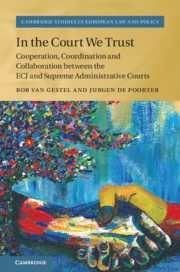 In the Court We Trust
In the Court We Trust Published online by Cambridge University Press: 28 November 2019
This chapter is setting the scene for the research. It starts from the astonishment that on the one hand the CJEU time and again underlines the dialogical nature of the preliminary reference procedure, while there are very view visible signs of an actual exchange of views and preparedness to share responsibility. What does this mean? Is there actually a judicial dialogue between the CJEU and highest administrative and, if not, why would the latter accept that their relationship is presented in terms of a shared responsibility and mutual cooperation? Answers to these questions are sought through a study of the literature on judicial law making, a case law analysis and interviews with judges. To this end we analytically split the research up in three phases: interaction before a preliminary question is submitted, during the procedure in Luxembourg and after the CJEU has ruled. Moreover, we explain why the focus lies on “regular” Supreme (Administrative) Courts instead of constitutional courts, which have dominated the debate on judicial dialogues so far.
To save this book to your Kindle, first ensure [email protected] is added to your Approved Personal Document E-mail List under your Personal Document Settings on the Manage Your Content and Devices page of your Amazon account. Then enter the ‘name’ part of your Kindle email address below. Find out more about saving to your Kindle.
Note you can select to save to either the @free.kindle.com or @kindle.com variations. ‘@free.kindle.com’ emails are free but can only be saved to your device when it is connected to wi-fi. ‘@kindle.com’ emails can be delivered even when you are not connected to wi-fi, but note that service fees apply.
Find out more about the Kindle Personal Document Service.
To save content items to your account, please confirm that you agree to abide by our usage policies. If this is the first time you use this feature, you will be asked to authorise Cambridge Core to connect with your account. Find out more about saving content to Dropbox.
To save content items to your account, please confirm that you agree to abide by our usage policies. If this is the first time you use this feature, you will be asked to authorise Cambridge Core to connect with your account. Find out more about saving content to Google Drive.